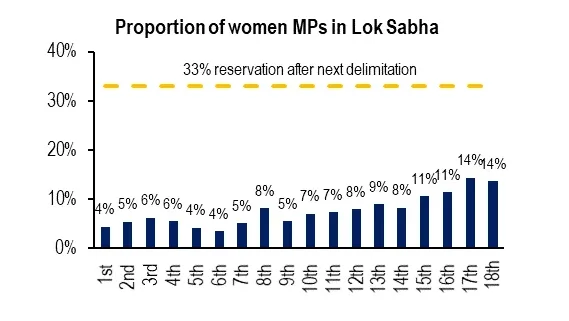The socio-economic profile of parliamentarians in India has evolved significantly since 1947. The representation of different social groups, particularly women and OBCs, has changed across three distinct phases. Despite advancements, challenges such as the criminalization of politics and low female participation persist. Addressing these issues is essential for fostering a more inclusive and equitable political landscape.
Parliamentarians in India
Parliament as a Reflection of Society
- Mirror of Society: The composition of Parliament serves as a reflection of societal values and shifts.
- Indications of Change: The profile of Parliament provides valuable insights into the evolving nature and direction of society.
Similarities in Parliamentary Profiles
- Uniformity Across Levels: There is no significant difference in the profiles of members across different levels of governance, including Parliament and state legislatures.
- No Distinction Between Houses: The profiles of members in the upper house and lower house of Parliament are also similar.
Phases of Changing Profiles of MPs
- Three Phases: Shankar and Rodrigues categorize the changing profiles of Members of Parliament (MPs) into three distinct phases.
First Phase (1947-1967)
- Parliament was composed mainly of Brahmins and OBCs, with a few women representatives, including Amrit Kaur, the first female union Minister of Health.
- Educational background was dominated by foreign university graduates, with many lawyers and agriculturists among parliamentarians.
Enroll now for UPSC Online Course
Second Phase (1967-1989)
- The Democratic Upsurge era saw a consolidation of OBC representation in parliament.
- Common professions among parliamentarians included agriculturists and social workers.
Third Phase (1989-Present)
- This phase, marked by “plebeianisation,” (mobocracy) witnessed a surge in OBC dominance and the entry of business personalities into politics.
- The criminalization of politics increased significantly during this period.
- Representation of women and minority sections remained largely unchanged.
Criminalisation of Politics: An Ongoing Issue
The Association for Democratic Reforms (ADR) reports that 24% of Rajya Sabha members and 43% of Lok Shabha MPs face criminal cases.
- Contributing factors include lack of political will, enforcement issues, and legal loopholes.
Measures for Reform: Suggested Actions
- Recommendations for addressing criminalisation include:
- Ensuring transparency
- Promoting citizen awareness
- Providing statutory status to the Model Code of Conduct
- Empowering the Election Commission of India
- De-recognizing parties supporting criminals
- Establishing Fast Track Courts
- Breaking the criminal-politician nexus
- Demonstrating strong political will
Low Participation of Women in Politics
Low Participation Statistics
- Women hold only 15% of seats in the Lok Sabha and an average of 9% in state legislatures.
- India ranks 153rd globally in women’s representation in national parliaments.
- Only Bihar and Rajasthan have a 14% representation, exceeding the average.
Obstacles to Participation
- Deeply ingrained patriarchal attitudes.
- The pervasive influence of identity politics.
- Women face political apathy and subtle discrimination.
- Lack of access to resources and training opportunities.
- Difficulty balancing work and family responsibilities.
Importance of Women’s Participation
- Achieving equity, inclusiveness, and effective governance.
- Women bring diverse perspectives and sensitivity to gender issues.
- Leads to more gender-sensitive policies, improved governance, and enhanced responsiveness to all citizens.

Measures for Improvement
Addressing Low Participation of Women in Politics: To address the low participation of women in politics, various measures can be implemented.
- The Zipper System: adopted by the Rwandan Patriotic Front, reserves every third seat for women candidates, ensuring a more equitable representation.
- Promoting Women To Leadership Positions: within political parties can help challenge stereotypes and encourage others to follow suit.
- Fostering Inner-Party Democracy: Fostering inner-party democracy and elevating women from local bodies to higher governance levels can create a pipeline of experienced female leaders.
- Documented Positive Impacts of Reservations: The positive impact of reservations on local governance has been well-documented.
- Success Stories in Women’s Leadership: Increased representation of women has led to greater empowerment, enhanced leadership opportunities, and a shift in decision-making to focus more on women’s issues.
- A 2012 report by UN Women showcased success stories highlighting the positive outcomes of women’s leadership and participation in local governance.
- Persistent Challenges: However, challenges persist. The use of proxy candidates, often referred to as “Panchayat Pati” or “Sarpanch Pati,” where men act as de facto representatives of women elected to local bodies, undermines women’s autonomy and decision-making power.
- Moreover, the lack of resources, training, and entrenched gender stereotypes continue to hinder women’s advancement in the political realm.
- The Need for a Concerted Effort: Overcoming these challenges requires a concerted effort from political parties, civil society organisations, and the government to create an enabling environment for women’s participation in politics.
- Addressing Root Causes of Gender Inequality: By addressing the root causes of gender inequality and promoting women’s leadership, India can move towards a more representative and equitable political system.
Enroll now for UPSC Online Course
| Must Read | |
| Current Affairs | Editorial Analysis |
| Upsc Notes | Upsc Blogs |
| NCERT Notes | Free Main Answer Writing |
Conclusion
In conclusion, while progress has been made in increasing representation among various groups in Parliament, significant gaps remain, especially regarding women’s participation.
- Efforts to combat criminalization and promote gender equality in politics are crucial for a fair democracy. Implementing reforms and encouraging women’s leadership can enhance governance and ensure that diverse perspectives shape policies.
- A concerted approach is necessary to create a political system that truly represents all citizens.
Sign up for the PWOnlyIAS Online Course by Physics Wallah and start your journey to IAS success today!

 GS Foundation
GS Foundation Optional Course
Optional Course Combo Courses
Combo Courses Degree Program
Degree Program









